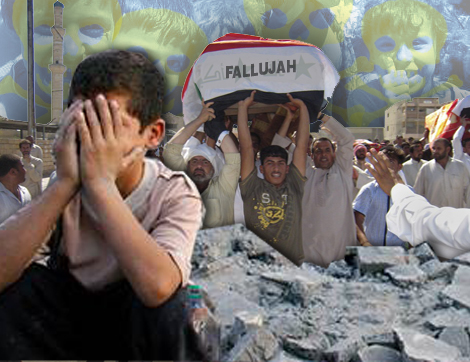
By Richard Walker
It was once known as Iraq’s City of Mosques. But today Fallujah is known as a place where large numbers of children are born with deformities and many people there die from rare cancers. Now, new reports have linked the causes to depleted uranium munitions and white phosphorous shells that were used by United States forces during the brutal siege of the city in November 2004.
There was an abortive siege of Fallujah in April, 2004 following the public abduction and murder of four American mercenaries by a mob. But the ferocious November siege in that year stands out as a war crime for which the Bush administration should be held accountable.
In 2004, this newspaper was one of the few that shone a light on the slaughter of civilians in Fallujah. In contrast, the mainstream media became the cheerleader for the propaganda that Fallujah was inhabited by thousands of foreign fighters.
Recently Ross Caputi, a former Marine, said that the U.S. chain of command told Marines there were 2,000 foreign fighters in the city and that most civilians had been evacuated. That was a lie. There were still 60,000 civilians in a city of originally 250,000 inhabitants when the siege began. Therefore, the fatal impression given to soldiers that all those who remained posed a lethal threat was far from true.
After a three-week bombardment, more than half of Fallujah was leveled, including 65 mosques. One of the first buildings targeted was the main hospital, which meant there were no surgeons to treat civilians wounded during the siege. Marines used Hellfire missiles, tanks loaded with depleted uranium artillery shells, large quantities of C4 explosives and Mark 19 grenade launchers. From the air, phosphorous bombs were dropped as well as 2,000-pound bombs. In Caputi’s words, “Everything was used.”
Marines also employed the tactic of “reconnaissance by fire,” which involved firing into homes and buildings to determine if anyone lived in them. By Caputi’s reckoning, there was not only looting of the dead but mutilation of bodies, which has become an emerging feature of the war in Afghanistan.
The civilians trapped in Fallujah were defenseless as a battle raged around them. Of the 200,000 inhabitants who did flee, many were forced to seek shelter in the desert right outside the city. A grave containing 21 bodies wrapped in black body bags of the type used by the Marine Corps has since been unearthed in a cemetery in the center of the city. It is believed it dates to the November, 2004 siege. The victims had been bound, gagged and shot execution-style.
Richard Walker is the pen name of a former N.Y. news producer.


